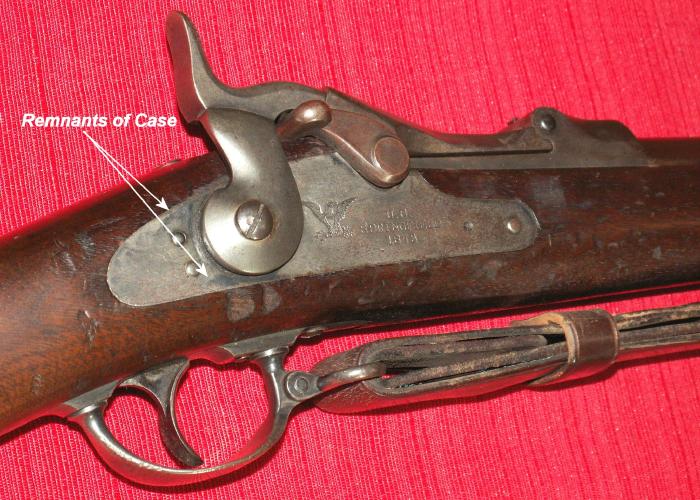
- 1873 Springfield Trapdoor Carbine Serial Numbers
- Winchester Model 1873 - Rifles - News - All4shooters.com
- U.S. Springfield .45-70 Gov’t Trapdoor Carbine
- See More Results
All model 1873's manufactured after serial number 525923 are considered modern and are subject to all the BATF Federal guide lines including back ground checks. There were over 720,000 Model 1873 Winchester 's manufactured. The longest barrel length known on a Model 1873 is 37 inches. The shortest known barrel length on a Model 1873 is 12 inches. The correct serial number is 132. The last digit was under the hammer. Approximate value US Model 1873 Springfield Trapdoor Carbine in Good shape original parts and Serial number 133465. According to Flayderman's Guide, these guns were made c.1873 to 1877, with total quantities in the 73,000 range this number includes rifles, carbines and cadet rifles. Note: Pre-1876 made carbines, under serial number 43,700, are considered typical of the model armed with Custer's 7th Cavalry. Condition: Very good plus. Barrel retains a blue/brown patina with faint case colors present to breech.
Make: US Springfield
Model: 1884 Trapdoor Rifle
Serial Number: 453629
Year of Manufacture: 1889
Caliber: .45-70 Government
Action Type: Trapdoor Rifle
Markings: The right side of the lock is marked with an Eagle, and “U.S. / Springfield”. The top of the receiver is marked “453629”. The letter “U” is found on the barrel bands. The top of the buttplate is marked “US”. The stock is well marked; the left side above the trigger has a nicely marked cartouche “SNP / 1889”, “H” and circle “P” behind the lower tang. The trapdoor is marked “US / Model / 1884”. There is “VP”, Eagle head and “P” on the barrel left side, and “A” on the top.
1873 Springfield Trapdoor Carbine Serial Numbers

Barrel Length: 32 5/8″
Sights / Optics: The front sight is a fixed blade and the rear sight is a Buffington model.
Stock Configuration & Condition: The stock is the original one piece, oil finished and military inspected piece of wood. There are scattered dings, marks and depressions, but no cracks. There is truly very little wear on the wood (especially relative to its age), there is very little oil staining and this may be the best piece of wood we have ever seen on a Trap Door. There is a tiny chip on the right side, forward of the sideplate. The LOP measures 13 3/8″ from the front of the trigger to the back of the steel plate. The stock rates in about Excellent overall condition.
Type of Finish: Blue & Color Case Hardened
Finish Originality: Factory Original – Guaranteed
Bore Condition: The bore is bright and the rifling is sharp. There is mild and scattered erosion towards the muzzle.
Overall Condition: This rifle retains about 90% of its metal finish. The balance of the finish shows thinning from a bayonet at the muzzle, marking and dings to the barrel at both bands and a light drift to patina at the chamber. The lock and trigger guard are also very blue, with freckled surface rust. The upper tang and lock are beautifully case color hardened, with still bright colors. The butt plate shows the much thinning and about 30% coverage of surface rust. Nonetheless, this is the best honest Trapdoor we have seen in a long time. The screw heads are about as sharp as you could expect, showing only slight distress. The markings are crisp. Overall, this rifle rates in about Excellent condition, certainly for its age.
Mechanics: The action functions correctly. We have not fired this rifle.

Winchester Model 1873 - Rifles - News - All4shooters.com
Box, Paperwork & Accessories: None
U.S. Springfield .45-70 Gov’t Trapdoor Carbine
Our Assessment: This is no doubt the best 1884 Trapdoor we have seen in years, possibly ever. The stock is as sharp as the metal. Everything is properly and well-marked and the gun is truly as sharp as could be expected for 123 year of wear and age.
See More Results
“The Model 1884 traces its roots back to the design of the Springfield Model 1873. Oddly, most of the changes that identify the Model 1884 as a distinct model occurred either before or after 1884. The Model 1884 incorporated a significant number of improvements that had been made between 1878 and 1879. It also featured a serrated trigger that had been incorporated into the Springfield rifle design in 1883.
The most dramatic change to the rifle design, which is often considered to be the identifying feature of the model 1884, was a new rear sight which had been designed by Lieutenant Colonel R. A. Buffington of the U.S. Army Ordnance Department. This sight however was not perfected until 1885.

The principle feature of this new sight was a rack and pinion style windage adjustment. Unlike previous sights, the base was not used for any position other than point blank. The raised leaf had graduations from 200 to 1400 yards. A new barrel band was also designed to accommodate this new sight so that it could lay flat in the point blank position.
Marksmen generally favored the new sight, but general troops were less enthusiastic about it and often considered it to be an annoyance.

The Model 1884 was also produced in a carbine version. It was found that the rear sight could be easily damaged when removing the rifle from the carbine boot. The rear barrel band was therefore modified in 1890 to include a rear sight protector.” http://en.wikipedia.org/wiki/Springfield_Model_1884
Sold For: $1,825
**********M1873 and M1877 Rifles SPAR1364 M1873 and M1877 Rifles .45 caliber. 1873-1878. 85,000 made. These were the first 'Trapdoor' designs chambered for a .45-70 caliber cartridge.
**********
M1879 Rifle SPAR5526 M1879 Rifle. .45 caliber. 1879-1885. c160,000 made. This was an improved version of the M1873 Rifle. This model also was made in carbine and cadet versions.
**********
M1884 Rifle SPAR5528 M1884 Rifle .45 caliber. 1885-1890. 232,500 made. This model, including carbine and cadet rifle versions, embodied improvements in the 'Trapdoor' design, adapted for a heavier bullet.
**********
Trowel Bayonet, M1873 SPAR1087 This bayonet's trowel-like design was intended to make it an entrenching tool. More than 10,000 of these bayonets were produced.
**********
M1888 Rifle SPAR5529 M1888 Rifle .45 caliber. 1889-1893. c. 65,000 made. Sony acid music studio 10 keygen. The last of the 'Trapdoor' series was also the last single-shot, black powder arm produced by Springfield. It incorporated a rod bayonet, a device that would be seen again in the early version of the M1903 rifle.
**********
